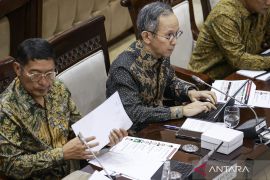"What it all needs is not about its (high or low) exchange rate but its stability. We consider that it will be stable if it does not disturb both internal and external equilibrium," BI Deputy Governor Budi Mulya said here on Thursday.
According to him, BI will continue to consider the factors that can influence the rupiah currency appreciation, including trends in other developing countries.
"BI will look at the factors that affect the value of the rupiah, the currency strengthening trend, not only in Indonesia but also in emerging countries. The strengthening trend is still rolling. Global liquidity is trying to return from countries which have strong economic fundamentals," he said.
Budi explained this strengthening was good to resist "imported inflation" so that the forecast at present put that inflation had not yet become that high yet that Indonesia`s trade competitiveness could be affected.
"If the rupiah continues to appreciate it would have impact on the competitiveness. This is a dilematic work. Our job is to keep guard in the middle so that its dilemma could be minimized," he said.
But he could not yet predict at what level the rupiah would be able to resist inflation and would not have impact on the trade surplus.
"If we set a range that means that we are setting a level. So, all we need is to maintain the rupiah stability," he added.
Budi said he wanted the most ideal assumption, namely the rupiah exchange rate was maintained at a range of Rp8.700-8800 against the greenback, by taking into account the fact at present that U.S. dollar depreciation had often taken place.
Meanwhile, the rupiah value against the U.S. dollar in the Jakarta interbank spot market on Thursday morning, was moving in a depressed position within 10 points from its previous day position of Rp8,512 to Rp8,522.
(Uu.A014/HAJM/HY-YH)
Editor: Priyambodo RH
Copyright © ANTARA 2011












